Die Rechtslage rund um Umrüstsätze für Elektrofahrräder ist komplex und vielschichtig. Dies spiegelt die rasante technologische Entwicklung und die unterschiedlichen Einstellungen der Gesetzgeber zur Elektromobilität wider. Da Elektrofahrräder insbesondere in städtischen Gebieten mit Verkehrsstaus und Umweltproblemen immer beliebter werden, wird der Bedarf an klaren Regelungen immer wichtiger. Umrüstsätze für Elektrofahrräder ermöglichen die Umrüstung herkömmlicher Fahrräder in Elektrofahrräder und bieten so ein erschwingliches und zugängliches Fortbewegungsmittel.
Dieser Wandel wirft jedoch Fragen zur Einhaltung bestehender Gesetze und Sicherheitsstandards sowie zu den Auswirkungen für Fahrer und Hersteller auf. Um sich in diesem rechtlichen Terrain zurechtzufinden, ist ein Verständnis der bundesstaatlichen und landesrechtlichen Vorschriften sowie lokaler Verordnungen, die zusätzliche Anforderungen stellen können, erforderlich. Die Unterscheidung zwischen Elektrofahrrädern und herkömmlichen Fahrrädern steht dabei oft im Mittelpunkt, da sie die Anwendung der Gesetze beeinflusst.
Beispielsweise kann die Klassifizierung eines Elektrofahrrads darüber entscheiden, ob es denselben Regeln wie herkömmliche Fahrräder unterliegt oder ob es unter die Kraftfahrzeugvorschriften fällt. Diese Klassifizierung kann von Land zu Land erheblich variieren. Daher ist es für Verbraucher und Hersteller wichtig, sich über die für ihre Situation geltenden Gesetze zu informieren.
Die wichtigsten Erkenntnisse
- Die bundesstaatlichen Vorschriften für Umrüstsätze für Elektrofahrräder werden von der Consumer Product Safety Commission und dem Verkehrsministerium geregelt.
- Die staatlichen und lokalen Gesetze zu Umrüstsätzen für Elektrofahrräder sind sehr unterschiedlich und es ist wichtig, sich über die spezifischen Vorschriften in Ihrer Region zu informieren und diese zu verstehen.
- Zu den Sicherheitsstandards und -anforderungen für Umrüstsätze für Elektrofahrräder gehören die ordnungsgemäße Installation, die Verwendung hochwertiger Komponenten und die Einhaltung der Herstellerrichtlinien.
- Die Lizenz- und Registrierungsanforderungen für Umrüstsätze für Elektrofahrräder können je nach Bundesstaat unterschiedlich sein. Es ist wichtig, sich bei den örtlichen Behörden über die spezifischen Vorschriften zu informieren.
- Zu den Ressourcen für die Navigation durch Vorschriften und Gesetze im Zusammenhang mit Umrüstsätzen für Elektrofahrräder zählen Branchenverbände, Rechtsexperten und Regierungswebsites.
Bundesvorschriften für Umrüstsätze für Elektrofahrräder
Auf Bundesebene wird der wichtigste Regulierungsrahmen für Elektrofahrräder von der Consumer Product Safety Commission (CPSC) festgelegt. Die CPSC definiert Elektrofahrräder als Fahrräder, die mit einem Motor ausgestattet sind, der nur dann Unterstützung bietet, wenn der Fahrer in die Pedale tritt. Diese Definition ist entscheidend, da sie Elektrofahrräder von Mopeds und Motorrädern abgrenzt, für die strengere Vorschriften gelten.
Die CPSC hat Richtlinien für die maximale Leistungsabgabe und Geschwindigkeitsbegrenzungen für Elektrofahrräder festgelegt. Diese liegen in der Regel bei 750 Watt (1 PS) und einer Höchstgeschwindigkeit von 20 Meilen pro Stunde in ebenem Gelände. Zusätzlich zu den CPSC-Richtlinien hat auch die Bundesregierung durch verschiedene Programme Anreize für die Nutzung von Elektrofahrrädern geschaffen. So enthält beispielsweise der Infrastructure Investment and Jobs Act Bestimmungen zur Finanzierung von Radwegen und Infrastrukturverbesserungen, die die Nutzung von Elektrofahrrädern unterstützen.
Diese Bundesinitiativen fördern zwar die Elektromobilität, regeln aber keine Umrüstsätze direkt. Aufgrund der fehlenden spezifischen bundesstaatlichen Aufsicht müssen sich Hersteller und Verbraucher auf die Gesetze der Bundesstaaten und Kommunen verlassen, um die Rechtmäßigkeit von Umrüstsätzen für Elektrofahrräder zu bestimmen.
Staatliche und lokale Gesetze für Umrüstsätze für Elektrofahrräder

Die Gesetze der Bundesstaaten zu Umrüstsätzen für Elektrofahrräder können sehr unterschiedlich sein und spiegeln die jeweilige Einstellung zum Radfahren und zur Elektromobilität wider. Einige Bundesstaaten haben Elektrofahrräder mit umfassenden Gesetzen gefördert, die verschiedene Klassen von Elektrofahrrädern anhand ihrer Leistungsabgabe und Geschwindigkeitskapazität definieren. Kalifornien beispielsweise hat ein Drei-Klassen-System eingeführt: Fahrräder der Klasse 1 verfügen nur über eine Tretunterstützung und erreichen eine Höchstgeschwindigkeit von 32 km/h. Fahrräder der Klasse 2 haben einen Gashebel und erreichen ebenfalls eine Höchstgeschwindigkeit von 32 km/h. Fahrräder der Klasse 3 können bis zu 45 km/h unterstützen, sind aber auf bestimmte Gebiete beschränkt.
Dieses Klassifizierungssystem hilft zu klären, wo und wie Elektrofahrräder genutzt werden dürfen, einschließlich der Einschränkungen auf Radwegen und -pfaden. Umgekehrt können in anderen Staaten restriktivere oder unklarere Gesetze bezüglich Umrüstsätzen für Elektrofahrräder gelten. In manchen Rechtsräumen gibt es möglicherweise keine klare Definition dessen, was ein Elektrofahrrad ausmacht, was zu Verwirrung bei Fahrern und Strafverfolgungsbehörden führt.
Darüber hinaus können lokale Gemeinden eigene Vorschriften erlassen, die die Rechtslage zusätzlich verkomplizieren. Beispielsweise kann eine Stadt eine Registrierung oder spezielle Sicherheitsausrüstung für E-Bikes verlangen, auch wenn das Landesrecht solche Maßnahmen nicht vorschreibt. Daher ist es für Personen, die Umrüstsätze in Betracht ziehen, wichtig, sowohl die staatlichen als auch die lokalen Vorschriften zu prüfen, um die Einhaltung sicherzustellen.
Sicherheitsstandards und -anforderungen
| Kategorie |
Standard |
Erfordernis |
| Konstruktion |
OSHA-Baunormen |
Alle Arbeiter müssen auf Baustellen Schutzhelme tragen |
| Herstellung |
ISO 45001 |
Regelmäßige Sicherheitsschulungen für alle Mitarbeiter |
| Transport |
FMCSA-Vorschriften |
Fahrer müssen die Arbeitszeitvorschriften einhalten |
| Gesundheitspflege |
OSHA-Gesundheitsstandards |
Fachgerechte Entsorgung von medizinischem Abfall |
Sicherheitsstandards für Umrüstsätze für Elektrofahrräder sind unerlässlich, um sowohl Fahrer als auch Fußgänger vor potenziellen Gefahren durch höhere Geschwindigkeit und Leistung zu schützen. Die CPSC hat Sicherheitsanforderungen für Fahrräder im Allgemeinen festgelegt, die auch für Elektrofahrräder gelten. Diese Standards decken verschiedene Aspekte des Fahrraddesigns ab, darunter Bremssysteme, Reflektoren und andere Sicherheitsmerkmale.
Gerade bei Umrüstsätzen mangelt es jedoch oft an standardisierten Prüf- oder Zertifizierungsverfahren. Hersteller von Umrüstsätzen werden daher dazu angehalten, sich an branchenübliche Best Practices zu halten, um die Sicherheit zu erhöhen. Dazu gehört die Verwendung hochwertiger Komponenten, die die Sicherheitsstandards von Organisationen wie dem American National Standards Institute (ANSI) oder der Internationalen Organisation für Normung (ISO) erfüllen oder übertreffen.
Darüber hinaus sollten sich Fahrer der Bedeutung der ordnungsgemäßen Installation und Wartung von Umrüstsätzen bewusst sein, um einen sicheren Betrieb zu gewährleisten. Ein schlecht installierter Satz kann zu mechanischen Ausfällen oder unsicheren Fahrbedingungen führen, was die Notwendigkeit gründlicher Recherche und gegebenenfalls professioneller Unterstützung unterstreicht.
Lizenzierung und Registrierung
Die Frage, ob für Elektrofahrräder eine Zulassung oder Registrierung erforderlich ist, ist je nach Rechtsraum sehr unterschiedlich. In vielen Bundesstaaten ist für Elektrofahrräder mit bestimmten Leistungsgrenzen ähnlich wie für herkömmliche Fahrräder keine Zulassung oder Registrierung erforderlich. Mit zunehmender Leistung oder wenn das Fahrrad als Fahrzeug der Klasse 3 eingestuft wird, können in einigen Bundesstaaten jedoch Zulassungsanforderungen gelten, die denen für Kraftfahrzeuge ähneln.
In New York City beispielsweise müssen E-Bikes der Klasse 3 beim Department of Motor Vehicles (DMV) registriert werden, während für Fahrräder der Klassen 1 und 2 keine solche Pflicht besteht. Lokale Vorschriften können die Angelegenheit zusätzlich erschweren. Manche Gemeinden haben möglicherweise eigene Regeln für die Zulassung oder Registrierung, die von den Landesgesetzen abweichen.
Städte wie San Francisco haben beispielsweise spezielle Anforderungen für E-Bike-Fahrer, darunter die Einholung einer Genehmigung für bestimmte Arten von Elektrofahrrädern. Fahrer sollten sich sorgfältig über die staatlichen und lokalen Anforderungen informieren, um mögliche Bußgelder oder rechtliche Probleme beim Fahren ihrer umgebauten Fahrräder zu vermeiden.
Ressourcen zur Navigation durch Vorschriften und Gesetze

Das komplexe Regelwerk rund um Umrüstsätze für Elektrofahrräder kann sowohl für Verbraucher als auch für Hersteller eine Herausforderung sein. Glücklicherweise gibt es verschiedene Ressourcen, die Einzelpersonen helfen, ihre Rechte und Pflichten in Bezug auf Elektrofahrräder zu verstehen. Die National Association of City Transportation Officials (NACTO) bietet wertvolle Informationen zu bewährten Verfahren für E-Bike-Richtlinien auf kommunaler Ebene und gibt Einblicke, wie Städte ein unterstützendes Umfeld für Elektromobilität schaffen können.
Darüber hinaus setzen sich Organisationen wie PeopleForBikes für eine Politik ein, die das Radfahren in all seinen Formen, einschließlich E-Bikes, fördert. Sie stellen Informationen zu bundeslandspezifischen Gesetzen und Vorschriften bereit und helfen Radfahrern, sich über Gesetzesänderungen zu informieren, die ihre legale Nutzung von Umrüstsätzen beeinträchtigen könnten. Darüber hinaus sind lokale Fahrradgeschäfte oft hervorragende Anlaufstellen für Informationen zur Einhaltung von Sicherheitsstandards und bewährten Installationspraktiken.
Durch die Nutzung dieser Ressourcen können sich Einzelpersonen besser in der Rechtslage rund um Umrüstsätze für Elektrofahrräder zurechtfinden und fundierte Entscheidungen über deren Verwendung treffen.
FAQs
Was sind Umrüstsätze für Elektrofahrräder?
Umbausätze für Elektrofahrräder sind Bausätze, die an einem normalen Fahrrad angebracht werden können, um es in ein Elektrofahrrad umzuwandeln. Diese Bausätze enthalten in der Regel einen Motor, eine Batterie, einen Controller und andere notwendige Komponenten, um das Fahrrad mit Strom zu versorgen.
Gibt es Vorschriften und Gesetze für Umrüstsätze für E-Bikes?
Ja, es gibt Vorschriften und Gesetze, die die Verwendung von Umrüstsätzen für Elektrofahrräder regeln. Diese Vorschriften können je nach Land, Bundesland oder lokaler Gerichtsbarkeit unterschiedlich sein, decken aber im Allgemeinen Aspekte wie Höchstgeschwindigkeit, Leistungsabgabe und Orte ab, an denen Elektrofahrräder gefahren werden dürfen.
Welche allgemeinen Vorschriften gelten für Umrüstsätze für Elektrofahrräder?
Zu den üblichen Vorschriften für Umrüstsätze für Elektrofahrräder können Höchstgeschwindigkeitsbegrenzungen (oft um die 32 km/h), Leistungsbegrenzungen (normalerweise um die 750 Watt) und Anforderungen an die Orte gehören, an denen Elektrofahrräder gefahren werden dürfen (z. B. Radwege, Straßen usw.).
Muss ich mein E-Bike anmelden, wenn ich einen Umbausatz verwende?
In manchen Regionen müssen E-Bikes mit Umrüstsätzen bei der örtlichen Verkehrsbehörde angemeldet werden. Prüfen Sie unbedingt die spezifischen Vorschriften in Ihrer Region, um festzustellen, ob eine Anmeldung erforderlich ist.
Gibt es Altersbeschränkungen für die Nutzung von Umrüstsätzen für Elektrofahrräder?
In manchen Ländern gelten Altersbeschränkungen für die Nutzung von Elektrofahrrädern mit Umrüstsätzen. Beispielsweise müssen Fahrer an manchen Orten mindestens 16 Jahre alt sein, um ein Elektrofahrrad fahren zu dürfen.
Benötige ich einen Führerschein, um ein E-Bike mit Umbausatz zu fahren?
Für den Betrieb eines E-Bikes mit Umbausatz ist vielerorts kein Führerschein erforderlich. Es ist jedoch wichtig, die spezifischen Vorschriften in Ihrer Region zu prüfen, um festzustellen, ob ein Führerschein erforderlich ist.
 OUKITEL P5000 Pro Tragbares Kraftwerk 5120Wh 4000W AC-Ausgang, nahtlose USV-Batterie-Backup mit Rädern Dual 100W USB-C LiFePO4
1 × 4 648,45 €
OUKITEL P5000 Pro Tragbares Kraftwerk 5120Wh 4000W AC-Ausgang, nahtlose USV-Batterie-Backup mit Rädern Dual 100W USB-C LiFePO4
1 × 4 648,45 € 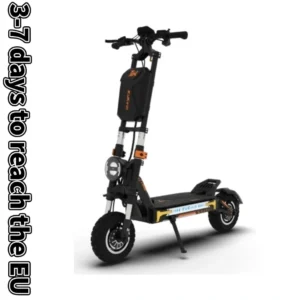 Kukirin G4 Max, G4 Max, 3200 W, 60 V, 35,2 Ah, 86 km/h, 95 km, 12 Zoll Elektroroller mit Doppelmotor
1 × 2 789,56 €
Kukirin G4 Max, G4 Max, 3200 W, 60 V, 35,2 Ah, 86 km/h, 95 km, 12 Zoll Elektroroller mit Doppelmotor
1 × 2 789,56 € 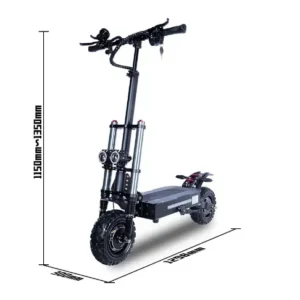 Electrib E5B 6000W 60V 40Ah 85km/h 150km 11" Faltbarer Elektroroller
1 × 1 236,31 €
Electrib E5B 6000W 60V 40Ah 85km/h 150km 11" Faltbarer Elektroroller
1 × 1 236,31 € 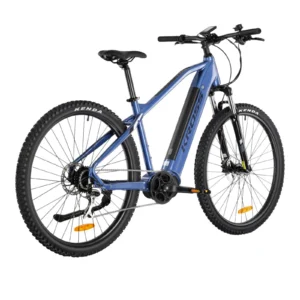 29 Zoll Elektrofahrrad für Erwachsene, 518 Wh versteckter Akku, 250 W Mittelmotor MTB, Elektro-Mountainbike mit 8-Gang-Getriebe, bis zu 120 km
1 × 1 274,19 €
29 Zoll Elektrofahrrad für Erwachsene, 518 Wh versteckter Akku, 250 W Mittelmotor MTB, Elektro-Mountainbike mit 8-Gang-Getriebe, bis zu 120 km
1 × 1 274,19 €  Cloudenergy CL48-150A 48V 150Ah Cabinet Type Lithium LiFePO4 Deep Cycle Battery Pack, 7680Wh Energy, 6000+ Life Cycles & 80% DOD
1 × 3 098,45 €
Cloudenergy CL48-150A 48V 150Ah Cabinet Type Lithium LiFePO4 Deep Cycle Battery Pack, 7680Wh Energy, 6000+ Life Cycles & 80% DOD
1 × 3 098,45 €  Tragbares Kraftwerk LANPWR 2200PRO mit On-Grid-Wechselrichterunterstützung 200 W/400 W/600 W/800 W, AC-Ausgang LiFePO4 2048 Wh ± 51 TP7T (40 Ah/51,2 V)
1 × 1 811,98 €
Tragbares Kraftwerk LANPWR 2200PRO mit On-Grid-Wechselrichterunterstützung 200 W/400 W/600 W/800 W, AC-Ausgang LiFePO4 2048 Wh ± 51 TP7T (40 Ah/51,2 V)
1 × 1 811,98 € 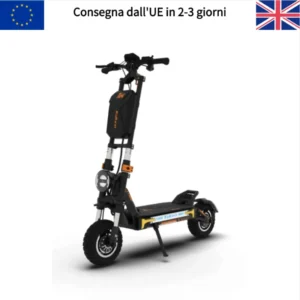 KuKirin G4 Max 3200W 60V 35,2Ah 86km/h 95Km 12" Offroad-Elektroroller
1 × 2 789,56 €
KuKirin G4 Max 3200W 60V 35,2Ah 86km/h 95Km 12" Offroad-Elektroroller
1 × 2 789,56 € 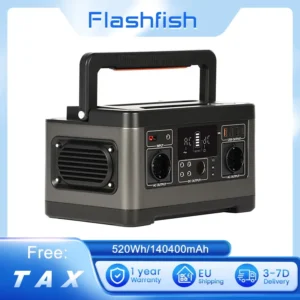 Flashfish P63 Tragbares Kraftwerk, 520 Wh/140400 mAh Lithium-Batterie-Solargenerator, 500 W AC-Ausgang, 5 x DC-Ausgänge, 4 x USB-Ausgänge
1 × 432,45 €
Flashfish P63 Tragbares Kraftwerk, 520 Wh/140400 mAh Lithium-Batterie-Solargenerator, 500 W AC-Ausgang, 5 x DC-Ausgänge, 4 x USB-Ausgänge
1 × 432,45 € 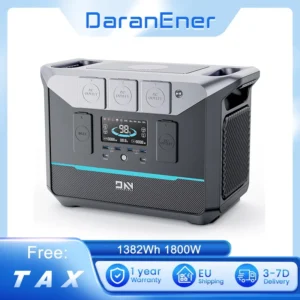 DaranEner NEO1500Pro Portable Power Station, 1382Wh LiFePO4 Solar Generator, 1800W AC Output, Charge to 80% in 1 Hour, 14 Ports
1 × 1 021,45 €
DaranEner NEO1500Pro Portable Power Station, 1382Wh LiFePO4 Solar Generator, 1800W AC Output, Charge to 80% in 1 Hour, 14 Ports
1 × 1 021,45 € 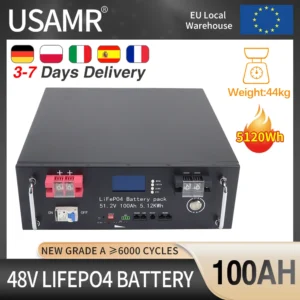 USAMR 100Ah 48V LiFePO4 Batterie
1 × 872,28 €
USAMR 100Ah 48V LiFePO4 Batterie
1 × 872,28 € 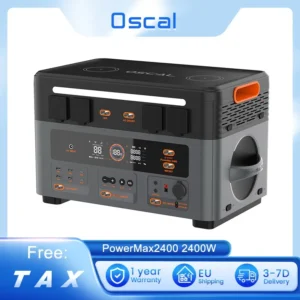 Oscal PowerMax2400, 2400 W, 1872 Wh, tragbares Kraftwerk, Doppellautsprecher, 1,2 Std. Schnellladung, App-Steuerung, 16 Ausgänge, bis zu 10 * BP2400
1 × 1 548,45 €
Oscal PowerMax2400, 2400 W, 1872 Wh, tragbares Kraftwerk, Doppellautsprecher, 1,2 Std. Schnellladung, App-Steuerung, 16 Ausgänge, bis zu 10 * BP2400
1 × 1 548,45 € 


